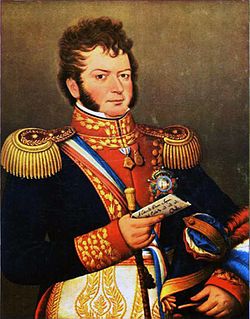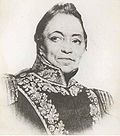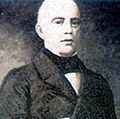Old Fatherland (1814)
In 1814 due to Royalist advances, the National Government Junta was dissolved with the intention of establishing a new title which would concentrate all the faculties of the Junta and its President in a single person and therefore help to coordinate more easily the Independentist forces against the Royalists; [2] a Consultative Senate was also established.
On March 7 Francisco de la Lastra was proclaimed as the first supreme director but as he was in Valparaíso and not in Santiago at the time, the Guatemalan Antonio José de Irisarri assumed as interim supreme director [3] for seven days, until March 14 when de la Lastra finally arrived at Santiago. [4]
The Regulation of the Provisional Government of 1814 established that:
“Article 1°. The critical circumstances of the day compel us to concentrate the Executive Power on a single individual, with the title of Supreme Director, as in him reside all faculties that the Government Junta had since its installation on September 18, 1810. Article 2°. Therefore his faculties are extensive and unlimited, with the exception of peace treaties, war declarations, the establishment of trade, and taxes or general public contributions, in which necessarily he will consult and reach an agreement with his Senate." [5]
The supreme director was to last 18 months on the position with possibility of extension by agreement of the Municipality and the Senate. [5]
On July 23, 1814, at 03:00 A.M, former President of the Government Junta general José Miguel Carrera led a coup d'état together with the Catholic Priest, Julián Uribe (who was in command of the artillery) which deposed de la Lastra, abolished de Directorial system and installed a new Government Junta with Carrera as its President. [6]
Organization of the Republic (1823-1826)
By the beginning of January 1823, general Ramón Freire intendant of Concepción and Chief of the Army of the South marched with his troops towards Santiago, in January 28 O'Higgins renounced as Supreme Director [7] and a Provisional Government Junta was established, led by Agustín de Eyzaguirre Arechavala who previously in 1813 had already served as President of the Government Junta. Freire and his troops were already in Valparaíso, near Santiago were they refused to recognise the new government and marched towards the capital. [9] Eventually Freire was proclaimed as Supreme Director on August 18, he would hold that position until July 9, 1826 [10] when Manuel Blanco Encalada became the first President of the Republic. [11]
Under the Directorate of Freire, a new Constitution, that of 1823, was promulgated, according to the aforementioned Constitution:
"A citizen with the title of Supreme Director administers the State in accordance with the laws and exercises exclusively the Executive Power. It will last for four years: being able to be re-elected a second time by two-thirds of the votes." [12]







